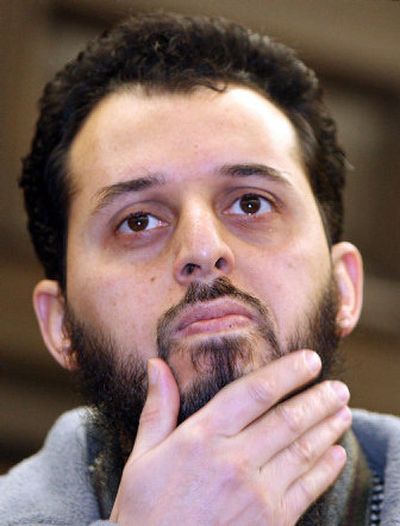Moroccan sentenced to 15 years for Sept. 11

HAMBURG, Germany – During an anguished exchange in a German courtroom Monday, an American whose mother was killed in the Sept. 11 attacks said he forgave a Moroccan convicted of aiding the hijackers.
But the victim’s son, Dominic Puopolo Jr., rebuked the defendant Mounir el Motassadeq for complaining that the accusations had “ruined” his life.
“Your life is not over, but my mom’s is,” Puopolo told el Motassadeq in an emotional exchange just before a state court in Hamburg imposed the 15-year sentence, the maximum under German law.
During closing arguments, Puopolo held up pictures of his mother and struggled with his tears as he urged the judges to consider the “human and emotional cost” of the attacks in New York, Washington and Pennsylvania.
The court granted el Motassadeq a final chance to speak before it pronounced sentence, and el Motassadeq, 32, turned to Puopolo.
“I understand your suffering,” he said. “The same thing is being done to me, my kids, my parents, my family – my future is ruined.”
Puopolo said he forgave el Motassadeq – but reminded him that he will one day be freed.
“You have a chance to rebuild your life and be back with your family. Others don’t,” Puopolo said.
Presiding Judge Carsten Beckmann, in explaining the verdict, said: “Anyone who helped in this has earned stiff punishment.” Defense lawyers said they would appeal.
Outside, Puopolo told reporters that he found the relatively lenient sentence “frustrating.” But he said it would still help ease the lingering pain of the loss of his mother, Sonia Morales Puopolo, an American Airlines flight attendant and former ballet dancer.
Under German law, Puopolo, of Miami Beach, Fla., was a co-plaintiff in the case.
Sonia Puopolo, 58, worked in the first class cabin of the aircraft piloted by Mohammad Atta, identified as the ringleader of the plot. The plane was one of two that hit the World Trade Center.
The Hamburg court revised an earlier, more lenient sentence for el Motassadeq after a federal appeals court convicted him in November of being an accessory to the murder of the 246 people aboard the four jetliners used in the 2001 attacks.
The appeals court had ruled that the Hamburg judges wrongly acquitted el Motassadeq in 2005 of direct involvement in the attacks, though they sentenced him to seven years in prison for belonging to a terrorist group. The federal judges ordered the state court to impose a new sentence.
El Motassadeq’s attorneys said they intend to challenge the latest 15-year sentence in the federal appeals court. They have already appealed the conviction to the Federal Constitutional Court, Germany’s highest, although it is unclear if the high court will consider the case.
Ladislav Anisic, a lawyer for el Motassadeq, said the defense team may also appeal the case to the European Court of Justice.
El Motassadeq was a close friend of Atta, Marwan al-Shehhi and Ziad Jarrah when they lived and studied in Hamburg. He has acknowledged training at an al-Qaida camp in Afghanistan and being close to the three hijackers. But he maintained during his trials that he knew nothing of their plans.
The federal appeals court said that the evidence proved el Motassadeq knew that the men planned to hijack and crash planes. It found that his actions – for example, transferring money, and helping the hijackers keep up the appearance of being regular university students by paying tuition and rent – aided the plot. The federal court ruled that it was irrelevant to el Motassadeq’s guilt whether he knew of the plot’s timing, dimension or targets.
Monday’s decision was the latest step in a legal saga that started with el Motassadeq’s arrest in November 2001 and featured two full trials.
He was convicted and sentenced to the 15 years in prison in 2003, but that verdict was overturned by a federal court the following year – largely because of lack of evidence. At a retrial that resulted in the 2005 conviction, the U.S. provided limited summaries from the interrogation of, among others, Ramzi Binalshibh, a suspected liaison between the Hamburg hijackers and al-Qaida.